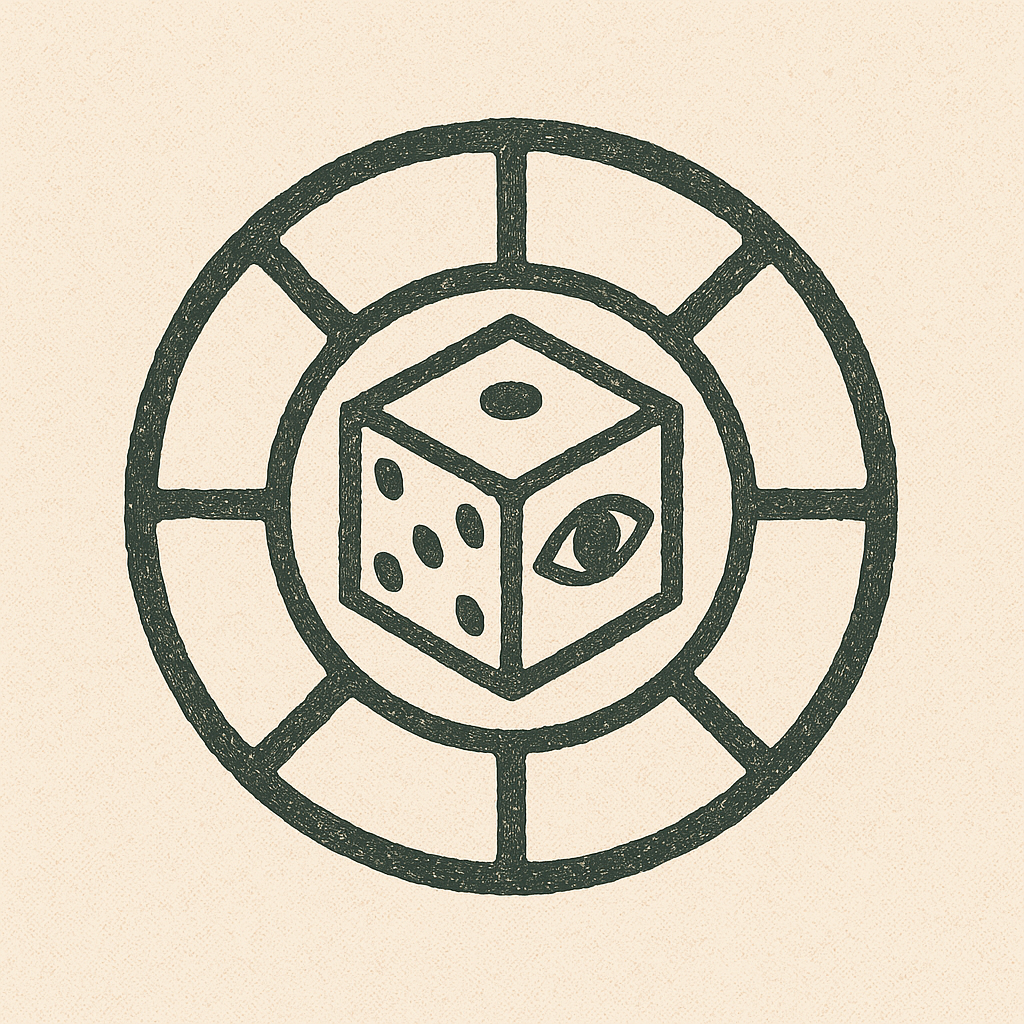Nahlolago
God of Prophecy, Luck, and Chance
Description of the Church
The Church of Nahlolago, known as The Temple of the Turning Wheel, is a vibrant, often theatrical religion that celebrates fate, risk, and the joy of the unknown. Where most churches build their power on certainty, Nahlolago’s celebrates the roll of the dice, the turn of the card, the sudden windfall or downfall.
Temples resemble gambling halls, observatories, or arcane theaters, and rituals feel more like games of chance than solemn rites. The faithful believe that every moment is a thread in the tapestry of destiny, and that fate weaves itself anew with each choice, each gamble, each breath.
Some worshippers seek to divine fate through prophecy. Others try to outwit it, or become one with its flow, trusting in instinct and absurdity. Unlike chaos, which shatters meaning, Nahlolago’s faith affirms that meaning is hidden in randomness—if you know how to read the signs.
Core Beliefs
- Fate is real, but not fixed.
- Chance is divine, for it speaks in every moment.
- Prophecy reveals patterns, not prisons.
- Luck favors the bold, not the reckless.
- Games reflect the soul, and laughter is a form of worship.
Religious Structure
The Turning Wheel is a sprawling web of temples, casinos, theaters, and traveling oracles.
- The Croupier of Stars – A mysterious figurehead or council believed to interpret fate’s grand design.
- Prophets of the Drawn Thread – Seers who read tarot, bones, stars, or dreams to divine futures.
- Jesters of Fortune – Trickster-priests who teach lessons through riddles, games, and unpredictability.
- Dealers of Fate – Clerics who travel and guide people through major decisions, offering tokens, odds, or omen-laced guidance.
- Acolytes of the Dice Eye – Initiates who must embrace randomness daily, giving up routine and control.
Rituals and Practices
- The Draw – A sacred moment of decision resolved through symbolic chance (cards, coins, etc.).
- Festival of the Flipped Coin – A celebration of choices, risk, and second chances.
- Wager of Meaning – A rite in which a supplicant stakes something valuable for the chance of divine insight.
- The Spiral Toss – A divination ritual in which stones or bones are cast across a board etched with symbols of fate.
Followers
- Diviners and prophets, seeking glimpses of fate’s shape.
- Performers and illusionists, who understand truth and trickery.
- Wanderers, who trust the path will reveal itself as they walk it.
Temples
Temples are whimsical, unpredictable, and filled with dice, spinning wheels, cards, stars, and chimes. Some double as entertainment halls, others as silent sanctuaries for the watching of signs.
Common features include:
- The Wheel of Echoes, spun before major decisions.
- The Starmap Dome, used for divination through celestial shifts.
- The Table of All Wagers, where sacred deals are struck with fate itself.
Conflict and Controversy
Disdained by Aergethyr’s clergy, who view randomness as morally irresponsible.
Tolerated by Marawae’s church, who see shared ground in inspiration and unpredictability.
Frequently questioned from within:
- Thread-followers, who try to find order in chance, and
- Roll-throwers, who embrace chance as the only constant.
Relationships with other gods
Central Architect: Nahlolago was imagined when mortals realized they could not predict what would happen next—and feared, or loved, that fact. He is the god of the turning point, the coin toss, the moment before the choice. Not pure randomness, but meaning in uncertainty. Artists say he lives in the silence before inspiration strikes—or doesn’t.
Relationship with Elustra (tricks): Co-conspirators. Where Elustra breaks truth for a laugh, Nahlolago bends it just enough to see what happens. They delight in each other’s unpredictability. Temples to both are often found near gambling halls and traveling theaters.
Rivalry with Rii-Ella (knowledge): Ideological friction. Rii-Ella seeks to preserve and explain; Nahlolago delights in disruption. She calls him dangerous. He laughs and rolls another die. Yet even she must admit: without randomness, no new story is ever born.

Symbol: A six-sided die mid-tumble inside a spinning wheel, with one face etched with an eye.
Meaning: Fate seen through randomness; guidance through the unexpected.
Domains: Dreams, luck, trickery, wealth. Alternate: Freedom
Favored Weapon: Shortsword
Divine Skill: Deception
Divine Font: Harm or heal
Santification: Can choose harm or heal
Ability: Dexterity, Charisma
Anathema: Relying solely on plans or denying chance



Comments